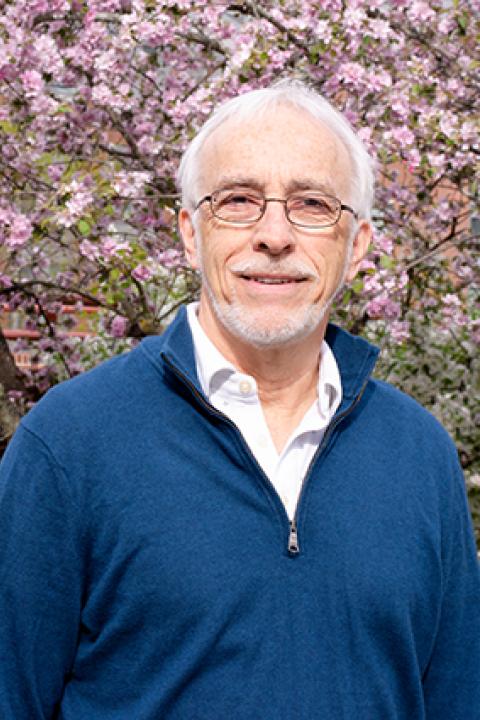
Christopher Bauer
Since the 1980s, Professor Bauer has been designing, implementing, and studying inquiry-based learning activities for students and for teachers from elementary through university level. His research interests include student attitudes, content misconceptions, and self-awareness as learners; discovery-based and cooperatively-structured college chemistry curricula; and faculty and future-faculty beliefs and practice. His work includes development of valid and reliable assessments of these issues, melding both quantitative and qualitative techniques derived from psychology, social psychology, and education. His work also encompasses a long history of outreach to the K-12 community as well as professional development for science faculty at all levels.
Courses Taught
- CHEM 403: General Chemistry I
- CHEM 404/404H: General Chemistry II
- CHEM 405: Chem Principles for Engineers
- CHEM 502: Adv Peer-led Team Ldrshp Chem
- CHEM 503: PLTL Mentoring
- CHEM 696: Independent Study
- CHEM 800: Intro Chem Practices
- CHEM 802: Critical Thinking Chem
- CHEM 803: Creative Thinking Chem
- CHEM/PHYS 501: Peer-led Team Learning in Chem
- INCO 501: Peer Coach Pedagogy
- INCO 501/502: Peer Coach Pedagogy
- INCO 502: Peer Coach Development
Education
- Ph.D., Chemistry, Colorado State University
- M.S., Chemistry, University of Illinois at Urbana-Champaign
- B.S., Chemistry, University of Notre Dame
Research Interests
- Educational Psychology
- Educational Testing/Measurement
- Graduate Education
- Higher Education
- Science Education
- Science/Technology/Engineering/Math (STEM) Education
- Teacher Education
- Undergraduate Education
Selected Publications
Gamby, S., & Bauer, C. F. (2022). Beyond "study skills": a curriculum-embedded framework for metacognitive development in a college chemistry course. INTERNATIONAL JOURNAL OF STEM EDUCATION, 9(1). doi:10.1186/s40594-022-00376-6
Bowe, K. A., Bauer, C. F., Wang, Y., & Lewis, S. E. (2022). When All You Have Is a Covalent Model of Bonding, Every Substance Is a Molecule: A Longitudinal Study of Student Enactment of Covalent and Ionic Bonding Models. JOURNAL OF CHEMICAL EDUCATION, 99(8), 2808-2820. doi:10.1021/acs.jchemed.2c00188
Bauer, C. F., Emenike, M. E., & Holme, T. A. (2022). Design of a Research-Based Assessment for Children?s Attitudes and Motivation at Chemistry Outreach and Museum Events. JOURNAL OF CHEMICAL EDUCATION, 99(8), 2821-2833. doi:10.1021/acs.jchemed.2c00191
Jeffery, K. A., & Bauer, C. F. (2020). Students' Responses to Emergency Remote Online Teaching Reveal Critical Factors for All Teaching. JOURNAL OF CHEMICAL EDUCATION, 97(9), 2472-2485. doi:10.1021/acs.jchemed.0c00736
Bauer, C. F., & Chan, J. Y. K. (2019). Non-science majors learn about heat, temperature, and thermodynamics using the particulate nature of matter and guided-inquiry instruction. AMERICAN JOURNAL OF PHYSICS, 87(7), 550-557. doi:10.1119/1.5110500
Chan, J. Y. K., & Bauer, C. F. (2014). Identifying At-Risk Students in General Chemistry via Cluster Analysis of Affective Characteristics. JOURNAL OF CHEMICAL EDUCATION, 91(9), 1417-1425. doi:10.1021/ed500170x
Bauer, C. F. (2008). Attitude towards chemistry: A semantic differential instrument for assessing curriculum impacts. JOURNAL OF CHEMICAL EDUCATION, 85(10), 1440-1445. doi:10.1021/ed085p1440
Bauer, C. F. (2005). Beyond "student attitudes": Chemistry self-concept inventory for assessment of the affective component of student learning. JOURNAL OF CHEMICAL EDUCATION, 82(12), 1864-1870. doi:10.1021/ed082p1864
KHEBOIAN, C., & BAUER, C. F. (1987). ACCURACY OF SELECTIVE EXTRACTION PROCEDURES FOR METAL SPECIATION IN MODEL AQUATIC SEDIMENTS. ANALYTICAL CHEMISTRY, 59(10), 1417-1423. doi:10.1021/ac00137a010
JENKINS, T. F., LEGGETT, D. C., GRANT, C. L., & BAUER, C. F. (1986). REVERSED-PHASE HIGH-PERFORMANCE LIQUID-CHROMATOGRAPHIC DETERMINATION OF NITROORGANICS IN MUNITIONS WASTE-WATER. ANALYTICAL CHEMISTRY, 58(1), 170-175. doi:10.1021/ac00292a042